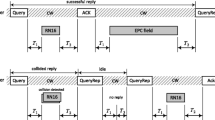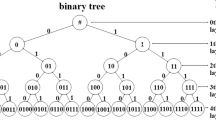Abstract
To improve the efficiency of the identification process in RFID system, anti-collision protocol is crucial. EPC Class-1 Generation-2 standard (Gen2) employs ALOHA-based Q algorithm as anti-collision protocol. However, the same updating rate will cause unnecessary collided and idle slots. In 2010, we proposed a Fast Q algorithm (FQA) that adjusted the value of Q with different steps. Recently, we find that the Fast Q algorithm can be further improved since it did not consider the probabilities of collided/idle slots. Accordingly, this paper proposes an Enhanced Fast Q algorithm (EFQA). In EFQA, Q will be updated after two continuous collided or idle slots with different updating rates, which are calculated by synthesizing the duration time of collided/idle slots and their probabilities. We then quantitatively analyze the performance of EFQA by establishing a Discrete-Time Markov Chain (DTMC) model. Simulation results show that EFQA outperforms other protocols regardless of the number of tags.








Similar content being viewed by others
References
A. Al-Fuqaha, M. Guizani, M. Mohammadi, M. Aledhari and M. Ayyash, Internet of things: a survey on enabling technologies, protocols, and applications, IEEE Communications Surveys & Tutorials, Vol. 17, No. 4, pp. 2347–2376, 2015.
D. K. Klair, K. W. Chin and R. Raad, A survey and tutorial of RFID anti-collision protocols, IEEE Communications Surveys & Tutorials, Vol. 12, No. 3, pp. 400–421, 2010.
X. Xie, X. L. Liu, H. Qi and K. Q. Li, Fast identification of multi-tagged objects for large-scale RFID systems, IEEE Wireless Communicatons Letters, Vol. 8, No. 4, pp. 992–995, 2019.
G. Hui, Z. Yan, B. Zhang, and F. Yu, Improved RFID anti-collision algorithm based on quad-tree. In Proceedings of the 2017 IEEE international conference on computational science and engineering (CSE) and embedded and ubiquitous computing (EUC), pp. 171–175, 2017.
S. C. Tsai, Y. M. Hu, C. H. Chai and J. S. Li, Efficient tag reading protocol for large-scale RFID systems with pre-reading, Computer Communications, Vol. 88, pp. 73–83, 2016.
L. Zhang, W. Xiang, X. Tang, Q. Li and Q. Yan, A time-and energy-aware collision tree protocol for efficient large-scale RFID tag identification, IEEE Transactions on Industrial Informatics, Vol. 14, No. 6, pp. 2406–2417, 2018.
Y. C. Lai, L. Y. Hsiao and B. S. Lin, Optimal slot assignment for binary tracking tree protocol in RFID tag identification, IEEE/ACM Transactions on Networking, Vol. 23, No. 1, pp. 255–268, 2015.
J. Teng, X. W. Xuan, and Y. Bai, A fast Q algorithm based on EPC Generation2 RFID protocol. In Proceedings of international conference on wireless communications networking and mobile computing (WiCOM), IEEE, Chengdu, pp. 1–4, 2010.
N. Cmiljanic, H. Landaluce and A. Perallos, A comparison of RFID anti-collision protocols for tag identification, Applied Sciences, Vol. 8, No. 8, p. 1282, 2018.
L. Zhang, W. Xiang and X. Tang, An efficient bit-detecting protocol for continuous tag recognition in mobile RFID systems, IEEE Transactions on Mobile Computing, Vol. 17, No. 3, pp. 503–516, 2018.
EPC Global, EPC radio-frequency identify protocols class 1 generation 2 UHF RFID protocol for communications at 860 MHz–960 MHz, Tech. Rep., version 1.2.0, 2008.
L. Sanchez and V. Ramos, Optimum power distance clustering for the EPC class-1 Gen2 standard in RFID systems, International Journal of Distributed Sensor Networks, Vol. 2015, No. 5, pp. 596–602, 2015.
S. Hassouni and H. Qjidaa, A design of modulator and demodulator for a passive UHF RFID tag using DTMOST compatible with C1 G2 EPC standard protocol, International Journal of Wireless Information Networks, Vol. 22, No. 4, pp. 407–414, 2015.
L. Arjona, H. Landaluce, A. Perallos and E. Onieva, A fast Fuzzy anti-collision protocol for the RFID standard EPC Gen-2, Electronics Letters, Vol. 52, No. 8, pp. 663–665, 2016.
F. Baloch and R. Pendse, Comparison of transmission control protocols based on EPC C1G2 standard, International Journal of Computing and Network Technology, Vol. 1, No. 1, pp. 83–94, 2013.
E. Vahedi, R. K. Ward, and I. F. Blake, Analytical modeling of RFID generation-2 protocol using absorbing Markov chain theorem. In Proceedings of global communications conference (GLOBECOM), IEEE, California, pp. 385–390, 2012.
E. Vahedi, R. K. Ward and I. F. Blake, Performance analysis of RFID protocols: CDMA versus the standard EPC Gen-2, IEEE Transactions on Automation Science and Engineering, Vol. 11, No. 4, pp. 1250–1261, 2014.
D. Lee, K. Kim, and W. Lee, Q+-algorithm: an enhanced RFID tag collision arbitration algorithm. In Proceedings of 4th international conference of ubiquitous intelligence and computing (UIC 2007), Hong Kong, China, pp. 23–32, 2007.
C. Wang, M. Daneshmand, K. Sohraby and B. Li, Performance analysis of RFID generation-2 protocol, IEEE Transactions on Wireless Communications, Vol. 8, No. 5, pp. 2592–2601, 2009.
M. He, S. J. Horng, P. Fan, M. K. Khan, R. S. Run, J. L. Lai and R. J. Chen, A fast RFID tag identification algorithm based on counter and stack, Expert Systems with Applications, Vol. 38, No. 6, pp. 6829–6838, 2011.
H. Huo, J. Q. Liu and Y. J. Wang, Flood diversion algorithm for anticollision in RFID system, International Journal of Distributed Sensor Networks, Vol. 11, No. 4, p. 245914, 2015.
Y. Jiang and R. Zhang, An adaptive combination query tree protocol for tag identification in RFID systems, IEEE Communications Letters, Vol. 16, No. 8, pp. 1192–1195, 2012.
H. Landaluce, A. Perallos, E. Onieva, L. Arjona and L. Bengtsson, An energy and identification time decreasing procedure for memoryless RFID tag anticollision protocols, IEEE Transactions on Wireless Communications, Vol. 15, No. 6, pp. 4234–4247, 2016.
Y. Wang, Y. Liu, H. Leung, R. Chen and A. Li, A multi-bit identification protocol for RFID tag reading, IEEE Sensors Journal, Vol. 13, No. 10, pp. 3527–3536, 2013.
N. Cmiljanic, H. Landaluce, A. Perallos and L. Arjona, Influence of the distribution of tag IDs on RFID memoryless anti-collision protocols, Sensors, Vol. 17, No. 8, pp. 1–20, 2017.
J. Su, Z. Sheng, L. Xie, G. Li and A. X. Liu, Fast splitting-based tag identification algorithm for anti-collision in UHF RFID system, IEEE Transactions on Communications, Vol. 67, No. 3, pp. 2527–2538, 2019.
Q. Xiao, S. Chen, M. Chen, Y. Zhou, Z. Cai and J. Luo, Adaptive joint estimation protocol for arbitrary pair of tag sets in a distributed RFID system, IEEE/ACM Transactions on Networking, Vol. 25, No. 5, pp. 2670–2685, 2017.
F. Zheng and T. Kaiser, Adaptive Aloha anti-collision algorithms for RFID systems, Eurasip Journal on Embedded Systems, Vol. 2016, No. 1, pp. 1–14, 2016.
L. Duan, X. Zhang, Z. J. Wang and F. Duan, A feasible segment-by-segment Aloha algorithm for RFID systems, Wireless Personal Communications, Vol. 96, No. 2, pp. 2633–2649, 2017.
X. Liu, K. Li, S. Guo, A. X. Liu, P. Li, K. Wang and J. Wu, Top-k queries for categorized RFID systems, IEEE/ACM Transactions on Networking, Vol. 25, No. 5, pp. 2587–2600, 2017.
H. Wu, Y. Wang and Y. Zeng, Capture-aware Bayesian RFID tag estimate for large-scale identification, IEEE/CAA Journal of Automatica Sinica, Vol. 5, No. 1, pp. 119–127, 2018.
X. H. Lin, H. Wang, Y. K. Kwok, B. Chen, M. Dai and L. Zhang, Exploiting the prefix information to enhance the performance of FSA-based RFID systems, Computer Communications, Vol. 56, No. 1, pp. 108–118, 2015.
J. Su, Z. Sheng, D. Hong and G. Wen, An effective frame breaking policy for dynamic framed slotted Aloha in RFID, IEEE Communications Letters, Vol. 20, No. 4, pp. 692–695, 2016.
Acknowledgements
This work is supported by the National Natural Science Foundation of China (No. 61504096). The authors also gratefully acknowledge the helpful comments and suggestions of the reviewers, which have improved the presentation.
Author information
Authors and Affiliations
Corresponding author
Additional information
Publisher's Note
Springer Nature remains neutral with regard to jurisdictional claims in published maps and institutional affiliations.
Rights and permissions
About this article
Cite this article
Xuan, X., Li, K. Efficient Anti-collision Algorithm for RFID EPC Generation-2 Protocol Based on Continuous Detection. Int J Wireless Inf Networks 27, 133–143 (2020). https://doi.org/10.1007/s10776-019-00465-4
Received:
Revised:
Accepted:
Published:
Issue Date:
DOI: https://doi.org/10.1007/s10776-019-00465-4




